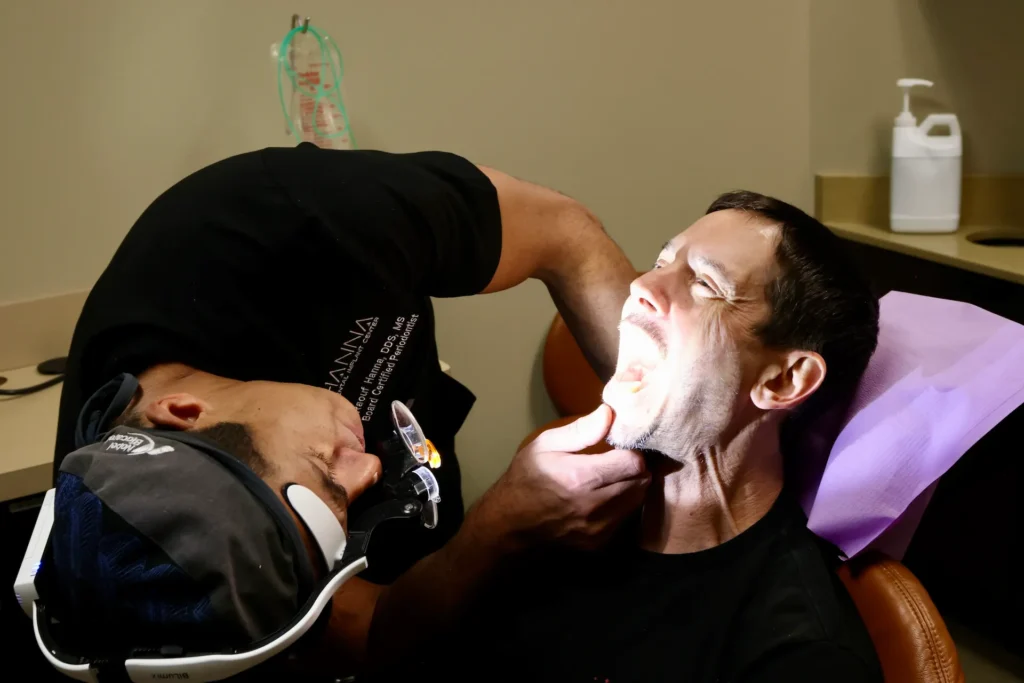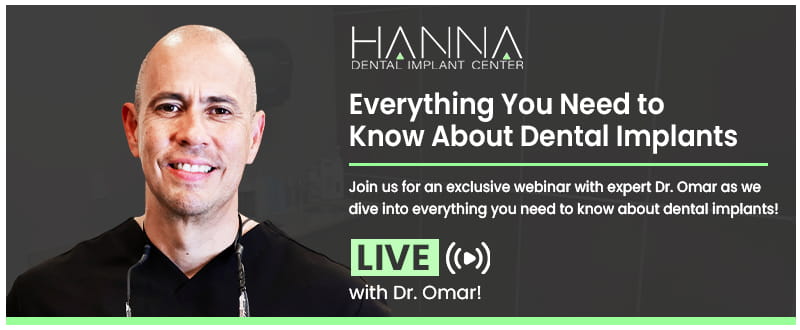Dental implants have an impressive success rate of over 95%. This means that you can have peace of mind knowing that your new smile has an excellent chance of looking and feeling natural!
However, proper healing of your dental implant is crucial to its long-term success, and our experienced team is here to guide you through every step of the journey. We understand the importance of carefully monitoring your healing process and ensuring that you achieve the best possible outcome.
Key Takeaways
- Successful healing is primarily indicated by a stable implant, minimal pain, and a comfortable return to chewing, all signs of proper osseointegration.
- Normal initial symptoms like mild swelling and discomfort should steadily improve, signaling a healthy start to your recovery.
- Good oral hygiene, a soft-food diet, and avoiding alcohol or smoking are key to supporting healthy healing and long-term implant success.
- Hanna Dental’s expert guidance will help you recognize normal progress and promptly identify any unusual persistent pain, implant movement, or discharge, ensuring swift, effective care for a successful dental implant healing journey.
Understanding the Dental Implant Process
A basic understanding of the dental implant procedure is the first step to gaining confidence and ease before your dental implant journey. The process involves surgically placing small titanium posts in the jawbone to serve as new tooth roots.
Over time, osseointegration occurs, where the surrounding bone fuses with the implant, creating a strong foundation for a dental crown or bridge. Osseointegration is a critical aspect of the healing process, ensuring stability and durability for the new tooth.
The importance of proper implant placement
Proper implant placement is vital for dental implants’ successful healing and long-term stability. Our skilled dentists meticulously assess factors such as jawbone density, structure, and limitations to determine the ideal position for the implant. Precise placement ensures optimal support and stability for the restoration, enhancing the success of the implant in the long run.
Factors that can influence osseointegration
Osseointegration is the process where the implant fuses with the jawbone, creating a strong and stable foundation for the new tooth. The natural healing mechanisms in your body begin as soon as the implant is placed, starting with the formation of a protective blood clot around the implant site. Over time, specialized cells called osteoblasts deposit new bone tissue around the implant, gradually integrating it into the jawbone.
The success of osseointegration depends on factors such as your overall health and oral hygiene. Patients who smoke or have diabetes are at a higher risk of implant failure. However, with our expert guidance and support, proper implant placement, and ample healing time, you can enjoy a restored smile with improved oral function and peace of mind.
Signs of a Healthy Healing Implant

Now that you have a good understanding of the dental implant process, let’s delve into the signs that indicate your implant is healing properly. Being able to recognize these indicators will provide you with the reassurance and confidence that your implant is on track for success.
Normal symptoms after an implant surgery
After your dental implant surgery, it’s completely normal to experience some mild discomfort, swelling, and minor bleeding. These symptoms typically subside within a few days and can be effectively managed with over-the-counter pain relievers and ice packs.
During the healing process, you may also notice some bruising around the implant site. This discoloration is simply a result of blood pooling beneath the skin and should not cause alarm. Rest assured that it will gradually fade away as your body continues to heal.
In the rare occurrence that the pain becomes more intense or persists beyond the first week, it’s important to reach out to your dentist so they can assess the situation and provide appropriate care and guidance.
Indicators of successful osseointegration
Successful osseointegration, the fusion of the implant with the surrounding bone, is a pivotal point in the healing journey of dental implants. We want to equip you with the knowledge to recognize positive signs of osseointegration. These indicators include:
- Stability of the implant
- Minimal pain or discomfort
- Chewing and biting with ease
Proper oral hygiene practices are crucial during the healing period. Gentle brushing around the implant site, along with the use of a recommended antibacterial mouthwash, promotes faster healing and reduces the risk of infections.
As your implant heals, you might experience a subtle metallic taste in your mouth. This taste is perfectly normal and stems from the materials used in the implant. Over time, it will gradually fade away.
Every individual’s healing process is unique. By following the instructions from our skilled dentists and diligently attending your appointments, you ensure the long-term success of your dental implant.
Warning Signs of Implant Healing Complications
Although it’s uncommon, not all dental implants heal without complications. Making yourself aware of the warning signs is important when needing to address any possible complications.
Symptoms of Infection or rejection
Though rare, infections or rejection of dental implants can occur. The body’s response to an implant varies; sometimes, the immune system may perceive the implant as foreign, leading to symptoms similar to an infection. If you experience persistent pain, swelling, warmth, or discharge around the implant site, contacting your dentist promptly is crucial. Early detection and treatment of an infection can prevent further complications.
Symptoms of implant failure
While implant failure is uncommon, paying attention to signs indicating a problem is essential. If your implant feels loose or moves, or if you experience persistent pain or discomfort around the implant site, seek immediate dental attention. Noticeable gum recession around the implant or visibility of the screw or abutment may also indicate complications. Dr Hanna will conduct a thorough examination to identify the cause and recommend the best course of action.
During the healing process, it’s possible to experience minor bone loss around the implant site, known as “crestal bone loss.” While this is a natural response of the body, excessive bone loss can lead to implant failure. That’s why attending all scheduled follow-up appointments is critical. Our team will monitor your healing progress and address any concerns promptly.
Promoting Healthy Healing of Dental Implants
Achieving a successful dental implant outcome is a collaborative effort between you and your dentist. While your dentist plays a vital role, you can take steps to promote healthy healing and optimize your overall implant experience.
Tips and best practices
Your dentist will provide you with expert tips and specific post-operative instructions tailored to your unique situation. This may include prescribed medications, a specific dental hygiene routine, and avoiding certain habits or activities that may disrupt the healing process.
Maintaining proper oral hygiene is crucial. This typically involves gently brushing the implant site and surrounding areas with a soft-bristle toothbrush, using antimicrobial mouthwash, and flossing carefully to remove any food particles or plaque. Your dentist may also recommend using special oral care products specifically designed for implants.
During the healing phase, it’s important to avoid certain foods that can be detrimental to the implant site. Hard, sticky, or chewy foods can potentially irritate the area or dislodge the implant. Opt for softer foods, such as soups, smoothies, or steamed vegetables, until your dentist advises you that it is safe to reintroduce a regular diet.
Many dental practices offer specific aftercare services and products to promote healing. This may include follow-up appointments with your dentist or oral hygienist to monitor the healing progress, cleanings using specialized instruments, or recommendations for oral care products specifically formulated for dental implants. Taking advantage of these resources can greatly contribute to the longevity of your implant.
Conclusion
Having insight into the signs and symptoms that indicate your dental implant is healing correctly or has complications is important for a successful implant process. Regular check-ups and open communication with your dentist play a vital role in monitoring your healing progress.
Place your trust in Hanna Dental to ensure you receive all the support and guidance you need. Our experienced team is dedicated to delivering the highest level of care and support, ensuring a successful outcome for your dental implant.
Remember, early detection of any potential complications is key to promptly addressing them and ensuring the overall well-being of your oral health.
Contact Hanna Dental today for the exceptional care you deserve!
FAQ’S
What does a failed dental implant feel like?
Signs of a failed dental implant may include a loose implant, tooth movement or twisting, discomfort, pain, or infection in the implant area.
What is the normal healing of dental implants?
The normal healing process of dental implants typically takes around 3 to 6 months. During this time, osseointegration occurs, which is the process of the implant post-fusing with the jawbone. The gum tissue also heals around the implant. Adequate healing ensures the stability and long-term success of the implant.
How can a dentist tell if an implant is failing?
Dentists can identify a failing implant through various signs, such as implant mobility, pain or discomfort in the implant area, inflammation or infection around the implant, and radiographic evidence of bone loss around the implant. Dentists may also use diagnostic tools, such as X-rays or CT scans, to assess the condition of the implant.
At what stage do dental implants fail?
Dental implants can fail at different stages, including during the initial healing period, shortly after implant placement, or even years later. Early detection and timely intervention are important to allow your dentist to identify the cause and recommend the best course of action moving forward.
What are the signs of dental implant infection?
Signs of dental implant infection may include persistent pain or discomfort, swelling or inflammation around the implant site, redness or tenderness in the gums, foul taste or odor, and implant mobility. If any signs of infection are present, it is important to seek professional evaluation and treatment promptly.
Rest assured that no matter what unlikely complications you may encounter, our trusted team at Hanna Dental is ready and equipped to assist you and ensure you maintain a happy and healthy smile!



